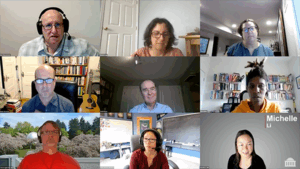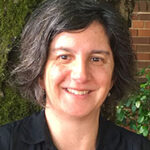JSM 2021: The Stories We Will Tell …
Nicole Lazar, 2021 JSM Program Chair
When the ASA Board made the hard decision to hold this year’s JSM in virtual format again—rather than in lovely Seattle, WA—many of us were disappointed. We missed seeing each other in person, sharing the energy generated when thousands of statisticians get together to talk about the field we love. Yet, as I visited sessions and social events on the virtual platform, I was heartened by how we managed as a community to recreate some of that same energy.At the opening mixer, we had the opportunity to play games, browse the invited posters, and gather in Zoom rooms to talk about such diverse topics as “books we like to read,” “statisticians and their pets,” and “people who like to sing.” Attendees got to strut their stuff during the virtual talent show. We gathered to congratulate new ASA Fellows and student paper award winners. And, of course, we participated in the featured lectures and technical sessions with their lively chat boxes.

The JSM Opening Mixer was hosted by Ron Wasserstein, ASA executive director (top left); Nicole Lazar, 2021 JSM program chair (top center); Mary Kwasny, Northwestern University (top right); Mark Glickman, Harvard University (center left); David Banks, Duke University (center); Emma Benn, Icahn School of Medicine at Mount Sinai (center right); Thomas Loughin, Simon Fraser University (bottom left); Claire Bowen, Urban Institute (bottom center); and Michelle Li, MIT (bottom right).
It will not, I think, be a surprise that COVID featured in many of the technical sessions at JSM 2021. I was struck, however, by the different aspects of the pandemic highlighted, with sessions on teaching and learning, data collection challenges, and vaccine development, among many others. Other popular topics this year included nontraditional data types, causal inference, high-dimensional data, machine learning, and deep learning. In keeping with this year’s theme of “Statistics, Data, and the Stories They Tell,” communication was also a key element of many talks and panels. Also of note were several anniversaries: 50 years of the Caucus for Women in Statistics; 50 years of ridge regression; and 30 years of the National Institute of Statistical Sciences.
Putting on a conference the size of JSM involves many people. Following are several who played huge roles:
JSM 2021 Program Committee Members
Saunak Sen, Associate Chair
Brisa Sanchez, Associate Chair
Ana-Maria Staicu, Poster Chair
Kathleen Wert, ASA Meetings Planner
Naomi Friedman, ASA Meetings Planner
Kristin Mohebbi, ASA Meetings Planner
Christina Link, ASA Meetings Planner
We had four interesting and engaging Introductory Overview Lectures. In order of appearance, these were the following:
- Julia for Statistics and Data Science, presented by Douglas Bates of the University of Wisconsin, Madison
- Advances in the Statistical Understanding of Random Forests and Related Methods and Their Use in Inference, presented by Giles Hooker of Cornell University and Lucas Mentch of the University of Pittsburgh)
- Fairness in Machine Learning, presented by Sherri Rose of Stanford University)
- Spatial Models for Massive Data Sets, presented by Sudipto Banerjee of the University of California, Los Angeles
These high-level talks provided attendees with the necessary background to enjoy many of the more technical presentations during the week.
In short, this year’s JSM attendees brought their enthusiasm and generated stories for years to come.
The two late-breaking sessions had a pandemic theme, reflecting the constantly changing state of affairs the world is still confronting. One focused on human trafficking analytics in the age of COVID and was organized by David Corliss of Peace-Work. The other focused on the business response to the pandemic and was organized by Emily Thomas of the Bureau of Labor Statistics.
As at all JSMs, we bade farewell to friends and colleagues through organized memorial sessions. There were three such sessions this year: for Lars Lyberg, organized by Michael Elliott, Frauke Kreuter, and Brady West; for Xiangrong Yin, organized by Jiaying Weng; and for George Cobb, organized by Allan Rossman.
The various special lectures are a way to honor the works and careers of distinguished colleagues. In alphabetical order, this year’s special lectures included the following:
- COPSS Distinguished Achievement Award and Lectureship, presented by Wing Hung Wong of Stanford University
- Deming Lecture, presented by Ivan S.F. Chan of AbbVie
- FN David Award Lecture, presented by Alicia Carriquiry of Iowa State University
- Le Cam Lecture, presented by Jianqing Fan of Princeton University
- Medallion Lectures, presented by Philippe Rigollet of MIT, Robert Nowak of the University of Wisconsin-Madison, Nancy Zhang of the University of Pennsylvania, and Axel Munk of the University of Göttingen
- Wald Lectures, presented by Jennifer Chayes of the University of California, Berkeley
In addition to these special lectures, both ASA President Rob Santos and IMS President Regina Liu gave invited addresses. Santos spoke about thoughts on the role of ‘self’ in a statistics career and Liu spoke about proactive and all-encompassing statistics.
One advantage of the online meeting format is that if you missed a talk or—as often happens at JSM—there were several talks of interest to you going on at the same time, you need not worry. All talks are available to registered attendees through the end of the year. Simply log back into the JSM platform using your credentials and you can view the recordings of any of the special presentations or technical sessions.
Some speakers uploaded their slides before or after their talks, and these are available in the online program.
And if you are wondering about this year’s public lecture, plans are afoot. If they come to fruition, we will hold it decoupled from JSM to adhere to the “public” part of the name more fully.
I am very much looking forward to seeing you next year in Washington, DC!
MORE FROM JSM 2021
Many Honored During Virtual Conference2021 SPAIG Award Honors Two Collaborations
Practical Significance Podcast Features a Discussion of JSM 2021 Sessions


















